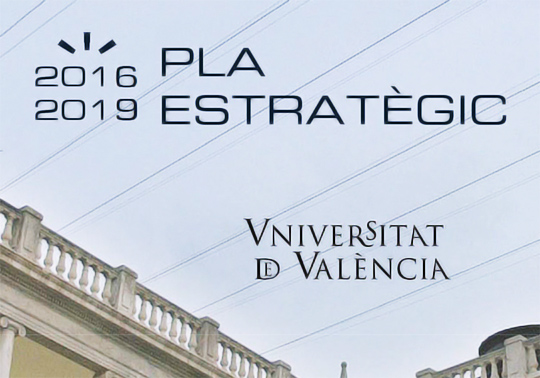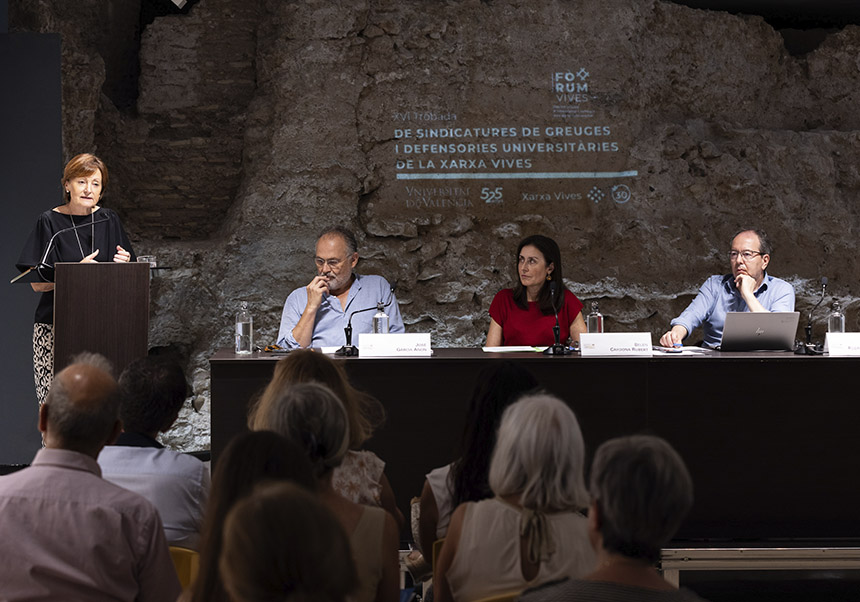The UV senate approves the management report of Universitat de València, as presented by the principal
- July 15th, 2016

Last Friday, UV´s senate has approved a management report of Universitat de València, which has been presented by the principal, Esteban Morcillo, and which marks the development of the Operative Plan 2015 and the framework of the Strategic Plan 2012-2015. The document has received 84 votes in favor, 14 negative votes and 15 blank ones. An Operative Plan 2017 has also been approved, as a part of the Strategic Plan for the 2016/2019 time period.
In his speech, the principal has analysed the political and the economic framework on which decisions about the university depend. The delay in the creation of the Government is an impediment to making decisions about the regulation of tuition fees, scholarships, replacement fees, the teaching load and other key matters. Estaban Morcillo has affrimed that the next academic year will be “full of uncertainties, not only economical but also legal ones”. Nevertheless, the institution will continue working to reduce tuition fees, a fair scholarship policy, and a teaching load which will allow the institution to maintain its high level of education.
The principal has read important data about the institution from the year 2015, that confirm UV as a reference in terms of the Valencian public education system, and maintains its high position in the international rankings when it comes to general quality and research.
In the report (which one can read in its entirety on http://links.uv.es/w2mSDo3), there is information about the initial budget of 319.283.000 euros, and that there were 60.791 students (undergraduate: 42.218, official master’s degree: 5.259, UV specific post-graduate degree: 8.928, and doctoral programme: 4.386), or the number of thesis read, which was 424.
During the question and answer session, the only one that spoke out was José Manuel Rodríguez who criticised the date of the meeting (as it reduces the possibilities of participation) and the triumphalist tone of the report.
Strategic Plan
Vice-principals Jorge Hermosilla and Juan Luis Gandía have presented the Strategic Plan for the 2016/2019 time period, and the Operational Plan of 2017. The document, which makes the information open to the public, shows the objectives and priorities which will direct the actions taken by UV during the 2016/2019 time period. With regard to the content, the plan maintains its four-fold structure which designate different areas of UV´s activities: teaching; research; campus life and participation; openness and innovation.
In each of these strategies, the institution, drawing from common resources, meets the needs of a wide and hetorogenous collective with specific and varied necessities.
In terms of teaching, the quality is based on two factors: efficiency, in terms of graduates which acquire valuable skills (adapted to the demands of the global and changing world, where employment is scarce but at the reach of those with recognized and specialised skills) and the students´ satisfaction with their university experience, which includes the academic dimension, as well as campus life and participation.
In the area of research, it´s necessary to raise the volume of scientific production within the parameters set by different reference frameworks which had been established and accepted by the scientific comminity and by different academic systems. The result ought to be the rise in scientific production, which has to be achieved through the expansion of staff with research capacities, in a way that this kind of sustainable effort forms a permanent part of the capacities of the institution. The aim is to correct the asymmetry in the current productivity levels, taking the current capacities of the institution as a starting point.
As to openness and innovation, the aim is to achieve a better position of the institution´s openness and innovation in the academic world and the society at large. It is important to place more value on research results and improve its applications by society.
When it comes to the campus life and participation strategy, the institution highlights the emphasis on equality, improving the visibility of women in the world of culture and social participation through the development of cross-disciplinary politics, as contained in the Equality Plan. Another goal is to accept the challenges of contemporary society through a policy of a high-quality of goods and services which the University offers.
The complete document can be read on: http://links.uv.es/MvHGQ3s
In the question and answer session, the dean of Social Sciences, Ernest Cano, has asked, among other things, for the improvement of the participation process and more attention paid to the specifics of a given field of knowledge, at the time when research is being evaluated. Professor María Iborra has proposed “clear political leadership” with regard to the strategic plan. The student Javier Antonio Sansalvador has demanded action to reduce the fees of dropping out of the degree. Professor Joan Carles Bernat has proposed measures to improve the reconciliation of work and family life and also to improve the hiring process, paying special attention to social criteria and sustainability. Professor Óscar Barberá has complaint about the fact that the Faculty of Tearcher Training has an elevated deficit of teaching staff, which causes a high degree of instability in the workforce. Finally, professor of Psychology, Hèctor Monterde, has asked for a reduction of teaching load for professors over 60 years old.
The vice-principal of Economics, Juan Luis Gandía, has presented the proposed previsions, and has expressed his concern about the scenario in which the institution is headed towards instability if adecuate measures are not taken. According to Gandía, it will be necessary for the Generalitat to raise its subsidies. Otherwise, an ajustment of expenses must be carried out.
File in: Pla Estratègic
















